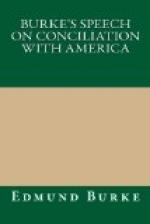The second of the great social and political problems, which employed English statesmen in the last half of the eighteenth century, was settled in the impeachment of Warren Hastings. The affairs of America and India were now overshadowed by the French Revolution, and Burke, with the far-sighted vision of a veteran statesman, watched the progress of events and their influence upon the established order. In 1773 he had visited France, and had returned displeased. It is remarkable with what accuracy he pointed out the ultimate tendency of much that he saw. A close observer of current phases of society, and on the alert to explain them in the light of broad and fundamental principles of human progress, he had every opportunity for studying social life at the French capital. Unlike the younger men of his times, he was doubtful, and held his judgment in suspense. The enthusiasm of even Fox seemed premature, and he held himself aloof from the popular demonstrations of admiration and approval that were everywhere going on. The fact is, Burke was growing old, and with his years he was becoming more conservative. He dreaded change, and was suspicious of the wisdom of those who set about such widespread innovations, and made such brilliant promises for the future. But the time rapidly approached for him to declare himself, and in 1790 his Reflections on the Revolution in France was issued. His friends had long waited its appearance, and were not wholly surprised at the position taken. What did surprise them was the eagerness with which the people seized upon the book, and its effect upon them. The Tories, with the king, applauded long and loud; the Whigs were disappointed, for Burke condemned the Revolution unreservedly, and with a bitterness out of all proportion to the cause of his anxiety and fear. As the Revolution progressed, he grew fiercer in his denunciation. He broke with his lifelong associates, and declared that no one who sympathized with the work of the Assembly could be his friend. His other writings on the Revolution [Footnote: Letter to a Member of the National Assembly and Letters on a Regicide Peace.] were in a still more violent strain, and it is hard to think of them as coming from the author of the Speech on Conciliation.
Three years before his death, at the conclusion of the trial of Warren Hastings, Burke’s last term in Parliament expired. He did not wish office again and withdrew to his estate. Through the influence of friends, and because of his eminent services, it was proposed to make him peer, with the title of Lord Beacons field. But the death of his son prevented, and a pension of twenty-five hundred pounds a year was given instead. It was a signal for his enemies, and during his last days he was busy with his reply. The “Letter to a Noble Lord,” though written little more than a year before his death, is considered one of the most perfect of his papers. Saddened by the loss of his son, and broken in spirits,




